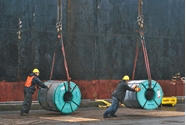Prices

September 27, 2022
Early Look at August Steel Imports: Down Another 6%
Written by Brett Linton
Preliminary US Census Bureau data indicates that steel imports will have totaled 2.51 million net tons during the month of August. This is down 6% from the prior month and potentially the lowest monthly rate seen since February of this year. Recall that monthly import levels also declined 6% from June to July. August figures are now down 19% compared to March’s 26-month high of 3.09 million tons.
Broken down by product category, preliminary finished steel imports in August are down 9% from July, imports of semi-finished products increased 8%, flat rolled imports rose 6%, long product imports fell 26%, imports of pipe and tube declined 17%, and stainless imports eased 5%.
Total September import licenses are currently at 1.86 million tons through Sept. 25th data, potentially the lowest level since December 2020 when imports were 1.50 million tons.

Preliminary imports of finished steels totaled 2.10 million tons in August, down 9% versus July and 17% less than a 46-month high in March. The latest license data shows finished steel imports down to 1.58 million tons in September, the lowest level seen since February 2021.

Due to large month-on-month swings in semifinished imports in recent years, the chart below shows total imports on a three-month moving average (3MMA) basis in an attempt to more accurately display trends. The 3MMA is 2.68 million tons through preliminary August data. This is down from 2.75 million tons the month prior and is now the lowest level seen since May 2021. September license data suggests that the 3MMA could decline to 2.35 million tons.
Although import levels have eased in recent months, trade still remains strong compared to recent years. Recall 2021 averaged 2.63 million tons per month, 2020 averaged 1.84 million tons per month, and 2019 averaged 2.32 million tons per month. In January 2022 the 3MMA had reached a 42-month high of 2.94 million tons. The lowest 3MMA level in SMU’s recent history was October 2020 at 1.36 million tons.

The table below displays flat-rolled product imports as well as other high-volume products, including rebar, tin plate, wire rod, structural pipe and tube, and other long products. We also provide data on imports divided into semifinished, finished, flat rolled, longs, pipe and tube, and stainless products.

The two charts below show monthly imports grouped by product category: flat-rolled imports and pipe and tube imports. August flat-rolled imports totaled 1.07 million tons, up 6% from one month prior, but down 5% from June. September licenses are currently showing 718,000 tons of flat-rolled steel to enter the country. Pipe and tube imports were 445,000 tons in August, down 17% from July’s 3+ year high. September pipe and tube imports could somewhat rebound, with licenses currently up 10% to 489,000 tons.


We have an interactive graphing tool available on our website here. Readers can explore historical import data, in total and by product. If you need assistance logging into or navigating the website, contact us at Info@SteelMarketUpdate.com.
By Brett Linton, Brett@SteelMarketUpdate.com







